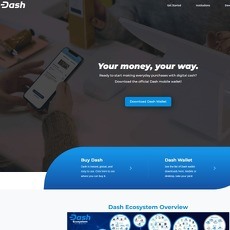Best Privacy Coins & Tokens (2026) – Monero, Zcash, Dash + More
The Ultimate Guide to Crypto Privacy Coins: Navigating the Future of Anonymous Transactions
The world of cryptocurrencies is vast, varied, and, at times, a little confusing. As someone who has spent a significant portion of my life studying, trading, and evangelizing about the wonders of the digital currency space, I've seen firsthand the meteoric rise of Bitcoin, the fervent debates surrounding Ethereum, and the dazzling array of altcoins that have sprung into existence. But today, dear reader, I want to dive deep into a niche but crucial segment of the crypto universe: privacy coins.
Why Privacy Coins Matter
In the digital age, the line between public and private has never been blurrier. While cryptocurrencies like Bitcoin were initially heralded as anonymous, it soon became clear that this wasn't entirely the case. Every Bitcoin transaction, no matter how small, is recorded on a public ledger, visible for anyone to see. For some, this transparency is a strength. But for many others, it's a glaring weakness. Enter privacy coins. These coins, designed with the core principle of maintaining user anonymity, have become the refuge for those seeking true financial privacy in the digital realm. The importance of such coins cannot be overstated in a world where every digital move is tracked, traced, and often sold to the highest bidder.
The Leading Privacy Coins
Before delving deeper into the mechanisms that underpin these coins, let's first get acquainted with the leading players in the space.
Monero (XMR)
Undoubtedly the most well-known of the privacy coins, Monero has become synonymous with crypto privacy. Unlike Bitcoin, where transactions can be traced back to individual wallet addresses, Monero transactions are completely confidential. Its stealth addresses and ring confidential transactions ensure that transaction details (like the sender, receiver, and amount) remain hidden.
Zcash (ZEC)
Another heavy hitter in the world of privacy coins, Zcash offers the option of "shielded" transactions, which hide the sender, recipient, and value of transactions on the blockchain. Its zero-knowledge proofs allow transactions to be verified without revealing any of their contents.
Dash (DASH)
Though Dash started as a privacy-centric coin, it has since pivoted to emphasize its functionality as a digital cash solution. Nonetheless, it does offer a "PrivateSend" feature, which mixes users' transactions to obscure their origins.
Others Worth Mentioning
Several other coins, like Verge (XVG), PIVX, and Horizen (ZEN), have also made notable efforts in the privacy arena. Each has its own unique approach and methodology to achieve transactional anonymity.
The Tech Behind the Privacy
It's not just about slapping a "private" label on a coin. The level of privacy achieved depends heavily on the technological backbone of the coin. Here are some key mechanisms employed by these coins:
Ring Signatures & Stealth Addresses
These are Monero's bread and butter. A ring signature mixes a user's account keys with public keys from the blockchain, making it nearly impossible to identify the actual signer. Stealth addresses, on the other hand, ensure that the receiving address of a transaction remains concealed.
Zero-Knowledge Proofs
A technological marvel, zero-knowledge proofs, particularly zk-SNARKs (used by Zcash), allow one party to prove to another that they possess a particular piece of information without revealing that information.
Coin Mixing
Used by coins like Dash, coin mixing involves combining multiple transactions into one, making it harder to determine the individual sources of the funds.
Are Privacy Coins Legal?
This is a question I hear often. The answer, like many things in the crypto world, is complex. In many countries, privacy coins themselves are not illegal. However, they've come under scrutiny from regulators and law enforcement agencies due to concerns about their potential use in illicit activities. Some exchanges have delisted privacy coins to comply with local regulations or out of an abundance of caution. It's crucial to stay informed and adhere to local regulations when trading or using privacy coins.
Conclusion: The Future of Privacy Coins
In a world where our digital footprints are constantly monitored, the role of privacy coins becomes increasingly vital. While challenges from regulators loom large, the promise and potential of true financial privacy ensure that these coins have a bright future ahead. So, whether you're a crypto newbie or a seasoned trader, I urge you to keep an eye on privacy coins. They're not just a passing trend; they might just be the future of true digital freedom.
The Ultimate FAQ on Crypto Privacy Coins and Tokens
Welcome to the most comprehensive FAQ on privacy coins and tokens you'll find on the internet. As someone who's deeply embedded in the crypto world, I've crafted this guide to clear up common misconceptions, dive deep into the nuances, and highlight why privacy in the crypto sphere matters so much. Whether you're a newbie or a crypto veteran, you're sure to find some golden nuggets of information here.
1. What are privacy coins and tokens?
Privacy coins and tokens are cryptocurrencies that prioritize user anonymity and the confidentiality of transactions. Unlike mainstream cryptocurrencies like Bitcoin or Ethereum, which are pseudonymous (your transactions can be traced back to your wallet address), privacy coins hide the transaction details, ensuring greater privacy.
2. How are privacy coins different from regular cryptocurrencies?
The primary difference is in their approach to user anonymity. While Bitcoin and most altcoins operate on transparent blockchains (meaning transaction details are publicly available), privacy coins employ various mechanisms, such as ring signatures, stealth addresses, or zero-knowledge proofs, to conceal transaction details and ensure user privacy.
3. Why should I consider using privacy coins?
The digital realm has become a playground for surveillance, with many entities tracking our every move. While Bitcoin offers some level of privacy, it isn't truly anonymous. If you're looking for enhanced privacy and confidentiality in your transactions, privacy coins are the way to go. They're especially useful for those living in regions with oppressive governments or those who simply prioritize their digital privacy.
4. Are there any risks associated with privacy coins?
Like all cryptocurrencies, privacy coins come with their set of risks. Regulatory scrutiny is one of the biggest concerns. Due to their anonymous nature, privacy coins can be seen as facilitators of illicit activities, and some countries or exchanges might restrict or ban their use. Always ensure you're complying with local laws and regulations.
5. Can you list some popular privacy coins?
Certainly! Some of the notable players in the privacy coin arena include:
- Monero (XMR)
- Zcash (ZEC)
- Dash (DASH)
- Verge (XVG)
- PIVX
Each of these coins has its own unique approach to ensuring transactional privacy.
6. What are the technical mechanisms behind these privacy coins?
Different coins employ various methods:
- Ring Signatures & Stealth Addresses: Primarily used by Monero, this technique mixes user account keys with others to obfuscate the true source of a transaction.
- Zero-Knowledge Proofs: Used by Zcash, it allows transactions to be confirmed without revealing any transaction data.
- Coin Mixing: Coins like Dash mix multiple transactions together to obscure their origins.
7. Are privacy tokens the same as privacy coins?
Not quite. While both prioritize user privacy, the primary difference lies in their foundational structure. Coins have their own independent blockchains, while tokens operate on existing blockchain platforms. For example, an Ethereum-based token focusing on privacy would be a privacy token.
8. How do I buy privacy coins or tokens?
Most privacy coins or tokens can be purchased on cryptocurrency exchanges. Always choose reputable exchanges, do your research, and make sure the platform supports the specific privacy coin or token you're interested in.
9. Are privacy coins and tokens legal?
The legality varies by country. While the coins themselves might not be illegal, their use in certain transactions or their possession might be frowned upon or restricted in some jurisdictions. Always stay updated with your local regulations.
10. What's the future of privacy coins and tokens?
Privacy, in today's digital age, is becoming a rare commodity. As people become more conscious of their digital footprints, the demand for privacy-focused solutions, including privacy coins and tokens, will likely grow. While regulatory challenges are a concern, the promise of true digital privacy ensures these digital assets have a bright future.



